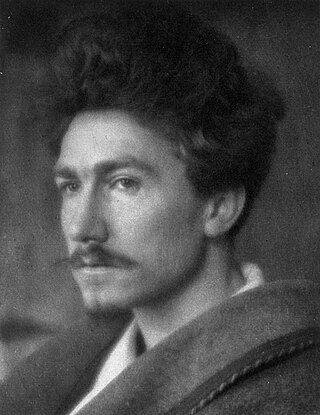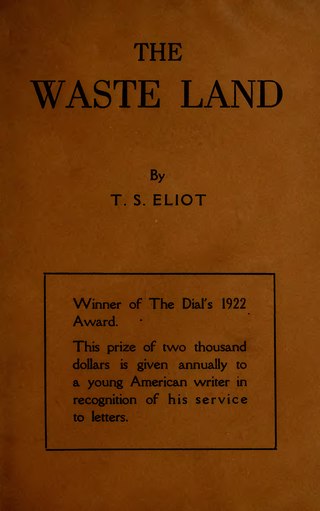Free verse is an open form of poetry, which in its modern form arose through the French vers libre form. It does not use consistent meter patterns, rhyme, or any musical pattern. It thus tends to follow the rhythm of natural speech.

Ezra Weston Loomis Pound was an expatriate American poet and critic, a major figure in the early modernist poetry movement, and a collaborator in Fascist Italy and the Salò Republic during World War II. His works include Ripostes (1912), Hugh Selwyn Mauberley (1920), and his 800-page epic poem, The Cantos.

Richard Aldington was an English writer and poet. He was an early associate of the Imagist movement. His 50-year writing career covered poetry, novels, criticism and biography. He edited The Egoist, a literary journal, and wrote for The Times Literary Supplement, Vogue, The Criterion, and Poetry. His biography, Wellington (1946), won him the James Tait Black Memorial Prize.

Imagism was a movement in early-20th-century poetry that favored precision of imagery and clear, sharp language. It is considered to be the first organized modernist literary movement in the English language. Imagism has been termed "a succession of creative moments" rather than a continuous or sustained period of development. The French academic René Taupin remarked that "it is more accurate to consider Imagism not as a doctrine, nor even as a poetic school, but as the association of a few poets who were for a certain time in agreement on a small number of important principles".

Hilda Doolittle was an American modernist poet, novelist, and memoirist who wrote under the name H.D. throughout her life. Her career began in 1911 after she moved to London and co-founded the avant-garde Imagist group of poets with American expatriate poet and critic Ezra Pound. During this early period, her minimalist free verse poems depicting Classical motifs drew international attention. Eventually distancing herself from the Imagist movement, she experimented with a wider variety of forms, including fiction, memoir, and verse drama. Reflecting the trauma she experienced in London during the Blitz, H.D.'s poetic style from World War II until her death pivoted towards complex long poems on esoteric and pacifist themes.

Modernist poetry in English started in the early years of the 20th century with the appearance of the Imagists. Like other modernists, Imagist poets wrote in reaction to the perceived excesses of Victorian poetry, and its emphasis on traditional formalism and ornate diction.
"In a Station of the Metro" is an Imagist poem by Ezra Pound published in April 1913 in the literary magazine Poetry. In the poem, Pound describes a moment in the underground metro station in Paris in 1912; he suggested that the faces of the individuals in the metro were best put into a poem not with a description but with an "equation". Because of the treatment of the subject's appearance by way of the poem's own visuality, it is considered a quintessential Imagist text.

A Portrait of the Artist as a Young Man is the first novel of Irish writer James Joyce, published in 1916. A Künstlerroman written in a modernist style, it traces the religious and intellectual awakening of young Stephen Dedalus, Joyce's fictional alter ego, whose surname alludes to Daedalus, Greek mythology's consummate craftsman. Stephen questions and rebels against the Catholic and Irish conventions under which he has grown, culminating in his self-exile from Ireland to Europe. The work uses techniques that Joyce developed more fully in Ulysses (1922) and Finnegans Wake (1939).
"Gerontion" is a poem by T. S. Eliot that was first published in 1920 in Ara Vos Prec and Poems. The title is Greek for "little old man," and the poem is an interior monologue relating the opinions and impressions of an elderly man, which describes Europe after World War I through the eyes of a man who has lived most of his life in the 19th century. Two years after it was published, Eliot considered including the poem as a preface to The Waste Land, but was talked out of this by Ezra Pound. Along with "The Love Song of J. Alfred Prufrock" and The Waste Land, and other works published by Eliot in the early part of his career, '"Gerontion" discusses themes of religion, sexuality, and other general topics of modernist poetry.

Dubliners is a collection of fifteen short stories by James Joyce, first published in 1914. It presents a naturalistic depiction of Irish middle class life in and around Dublin in the early years of the 20th century.

Paterson is an epic poem by American poet William Carlos Williams published, in five volumes, from 1946 to 1958. The origin of the poem was an eighty-five line long poem written in 1926, after Williams had read and been influenced by James Joyce's novel Ulysses. As he continued writing lyric poetry, Williams spent increasing amounts of time on Paterson, honing his approach to it both in terms of style and structure. While The Cantos of Ezra Pound and The Bridge by Hart Crane could be considered partial models, Williams was intent on a documentary method that differed from both these works, one that would mirror "the resemblance between the mind of modern man and the city."
Frank Stuart Flint was an English poet and translator who was a prominent member of the Imagist group. Ford Madox Ford called him "one of the greatest men and one of the beautiful spirits of the country".

Dora Marsden was an English suffragette, editor of literary journals, and philosopher of language. Beginning her career as an activist in the Women's Social and Political Union (WSPU), Marsden eventually broke off from the suffragist organization in order to found a journal that would provide a space for more radical voices in the movement. Her prime importance lies with her contributions to the suffrage movement, her criticism of the Pankhursts' WSPU, and her radical feminism, via The Freewoman. There are those who also claim she has relevance to the emergence of literary modernism, while others value her contribution to the understanding of Egoism.

John Rodker was an English writer, modernist poet, and publisher of modernist writers.

Harriet Shaw Weaver was an English political activist and a magazine editor. She was a significant patron of Irish writer James Joyce.

Modernist literature originated in the late 19th and early 20th centuries, and is characterised by a self-conscious separation from traditional ways of writing in both poetry and prose fiction writing. Modernism experimented with literary form and expression, as exemplified by Ezra Pound's maxim to "Make it new." This literary movement was driven by a conscious desire to overturn traditional modes of representation and express the new sensibilities of the time. The immense human costs of the First World War saw the prevailing assumptions about society reassessed, and much modernist writing engages with the technological advances and societal changes of modernity moving into the 20th century. In Modernist Literature, Mary Ann Gillies notes that these literary themes share the "centrality of a conscious break with the past", one that "emerges as a complex response across continents and disciplines to a changing world".
The New Freewoman was a monthly London literary magazine edited by Dora Marsden and owned by Harriet Shaw Weaver. Initially, Rebecca West was in charge of the literary content of the magazine, but after meeting Ezra Pound at one of Violet Hunt's parties in 1913 she recommended that he be appointed literary editor. The magazine existed between June 1913 and December 1913.

Des Imagistes: An Anthology, edited by Ezra Pound and published in 1914, was the first anthology of the Imagism movement. It was published in The Glebe in February 1914, and later that year as a book by Charles and Albert Boni in New York, and Harold Monro's Poetry Bookshop in London.
The Modernist Journals Project (MJP) was created in 1995 at Brown University in order to create a database of digitized periodicals connected with the period loosely associated with modernism. The University of Tulsa joined in 2003. The MJP's website states:
The Modernist Journals Project is a multi-faceted project that aims to be a major resource for the study of modernism and its rise in the English-speaking world, with periodical literature as its central concern. The historical scope of the project has a chronological range of 1890 to 1922, and a geographical range that extends to wherever English language periodicals were published. With magazines at its core, the MJP also offers a range of genres that extends to the digital publication of books directly connected to modernist periodicals and other supporting materials for periodical study.
We end at 1922 for both intellectual and practical reasons. The practical reason is that copyright becomes an issue with publications from 1923 onward. The intellectual reason is that most scholars consider modernism to be fully fledged in 1922, a date marked by the publication of James Joyce's Ulysses, Virginia Woolf’s Jacob’s Room, and T. S. Eliot's The Waste Land. We believe the materials on the MJP website will show how essential magazines were to modernism's rise.

The Waste Land is a poem by T. S. Eliot, widely regarded as one of the most important English-language poems of the 20th century and a central work of modernist poetry. Published in 1922, the 434-line poem first appeared in the United Kingdom in the October issue of Eliot's magazine The Criterion and in the United States in the November issue of The Dial. Among its famous phrases are "April is the cruellest month", "I will show you fear in a handful of dust", and "These fragments I have shored against my ruins".












